Hydro power is a renewable energy source that significantly impacts Bitcoin mining by providing an efficient and cost-effective alternative to fossil fuels. Countries rich in water resources, such as China and Canada, leverage hydroelectric power to lower operational costs and enhance sustainability in mining operations. Utilizing hydro power can substantially reduce carbon emissions, with studies indicating potential reductions of up to 90%. The article explores the advantages of hydro power in Bitcoin mining, including its environmental benefits, economic implications, and future trends in technology and regulatory support that promote its adoption. Overall, hydro power is positioned as a key component in the sustainable evolution of Bitcoin mining.

What is the Role of Hydro Power in Bitcoin Mining?
Hydro power plays a significant role in Bitcoin mining by providing a renewable and cost-effective energy source. Bitcoin mining requires substantial electricity for operations, and hydroelectric power can offer lower rates compared to fossil fuels. Countries with abundant water resources, such as China and Canada, utilize hydro power to support mining activities. In these regions, miners can capitalize on the lower operational costs associated with hydroelectricity. Additionally, hydro power contributes to a more sustainable mining process, reducing the carbon footprint associated with energy consumption. Studies indicate that using hydroelectric energy can decrease the environmental impact of Bitcoin mining significantly. This transition to renewable energy sources aligns with growing concerns over the ecological effects of cryptocurrency mining.
How does hydro power contribute to the Bitcoin mining process?
Hydro power contributes to the Bitcoin mining process by providing a renewable and cost-effective energy source. Bitcoin mining requires significant electricity to operate mining hardware. Hydro power plants generate electricity using flowing water, which can be abundant in certain regions. This allows miners to access low-cost energy, reducing operational expenses. Regions with ample water resources often have lower electricity rates, making them attractive for mining operations. For example, areas like Sichuan, China, leverage hydroelectric power to support Bitcoin mining. This reliance on renewable energy sources also aligns with sustainability goals in the cryptocurrency industry.
What are the key mechanisms of hydro power in energy generation?
Hydropower generates energy through three key mechanisms: water flow, turbine rotation, and generator operation. Water flow occurs when water from a river or reservoir is directed through a dam. This movement creates kinetic energy. The flowing water turns turbines, which convert the kinetic energy into mechanical energy. The rotation of the turbines drives generators. Generators then convert mechanical energy into electrical energy. According to the U.S. Department of Energy, hydropower accounts for about 37% of renewable electricity generation in the United States. This demonstrates the effectiveness of these mechanisms in producing energy sustainably.
How does the energy produced by hydro power impact Bitcoin mining efficiency?
Hydro power significantly enhances Bitcoin mining efficiency by providing a stable and cost-effective energy source. The energy produced by hydroelectric plants is often cheaper than fossil fuels, reducing operational costs for miners. Lower energy costs lead to higher profit margins for mining operations. Additionally, hydro power generates a consistent energy supply, ensuring that mining rigs operate at optimal levels without interruptions. This reliability improves overall mining output and efficiency. Regions with abundant hydroelectric resources can attract more mining facilities, further boosting the local economy. Studies show that hydro power contributes to a sustainable energy mix, decreasing the carbon footprint associated with Bitcoin mining.
What are the advantages of using hydro power for Bitcoin mining?
Hydro power offers several advantages for Bitcoin mining. First, it provides a renewable energy source, reducing reliance on fossil fuels. This leads to lower carbon emissions compared to conventional energy sources. Second, hydro power is often cheaper than other energy forms, resulting in reduced operational costs for miners. Studies indicate that hydroelectric energy can be 30-60% cheaper than coal or natural gas. Third, hydro power facilities can offer consistent electricity supply, which is crucial for uninterrupted mining operations. Additionally, regions with abundant water resources often have excess energy, allowing miners to capitalize on this surplus. Lastly, using hydro power enhances the sustainability of Bitcoin mining, aligning with broader environmental goals.
How does hydro power reduce the operational costs of Bitcoin mining?
Hydro power reduces the operational costs of Bitcoin mining by providing a low-cost energy source. Bitcoin mining requires significant electricity, which can be expensive. Hydro power plants generate electricity at a lower cost compared to fossil fuels. This cost-effectiveness stems from the renewable nature of hydroelectric energy. In regions with abundant water resources, the cost of hydroelectric power can be as low as $0.01 per kWh. This contrasts sharply with the average electricity prices in areas reliant on coal or natural gas. The reduced energy costs directly lower the overall expenses associated with Bitcoin mining operations. Additionally, hydro power is more sustainable, which can lead to long-term savings as regulations on carbon emissions tighten.
What environmental benefits does hydro power offer compared to other energy sources?
Hydropower offers significant environmental benefits compared to other energy sources. It produces electricity with minimal greenhouse gas emissions. According to the U.S. Department of Energy, hydropower accounts for about 31% of renewable energy generation in the U.S. This energy source does not rely on fossil fuels, reducing air pollution. Hydropower also conserves water resources, unlike coal or natural gas plants that consume large quantities. Furthermore, it can enhance local ecosystems by providing water for irrigation and recreational activities. Studies show that hydropower projects can create habitats for fish and wildlife. Overall, hydropower is a cleaner, more sustainable energy option.
Why is the location of hydro power plants significant for Bitcoin mining?
The location of hydro power plants is significant for Bitcoin mining due to their ability to provide low-cost, renewable energy. Bitcoin mining requires substantial electricity, and hydro power plants can generate electricity at a lower cost compared to fossil fuels. This cost efficiency directly impacts the profitability of mining operations. Additionally, locations with abundant water resources often have favorable climates for cooling mining equipment. Regions with hydroelectric facilities can also offer stable and reliable power supply, reducing the risk of outages. This stability is crucial for continuous mining operations, which rely on uninterrupted power. Furthermore, utilizing hydroelectric power aligns with sustainable practices, reducing the carbon footprint associated with Bitcoin mining.
What geographical factors influence the effectiveness of hydro power for mining operations?
Geographical factors that influence the effectiveness of hydro power for mining operations include water availability, topography, and climate. Water availability is crucial as it determines the volume of water flow for hydroelectric generation. Regions with abundant freshwater sources, like rivers and lakes, enhance hydro power efficiency. Topography affects the potential for creating reservoirs and the elevation drop for generating power. Steep terrains can facilitate higher energy generation through gravity. Climate also plays a role; areas with consistent rainfall or snowmelt provide reliable water sources year-round. For example, the Pacific Northwest in the United States benefits from these geographic factors, making it a prime location for hydroelectric power used in mining operations.
How do local regulations affect the establishment of hydro power facilities for Bitcoin mining?
Local regulations significantly impact the establishment of hydro power facilities for Bitcoin mining. These regulations dictate land use, environmental protection, and water rights. Compliance with local laws can affect project feasibility and timelines. For instance, strict environmental regulations may require extensive studies and permits. Additionally, zoning laws may limit where facilities can be built. Local government incentives or restrictions can also influence investment decisions. Regions with supportive regulations may attract more Bitcoin mining operations. Conversely, areas with stringent rules may deter investment in hydro power facilities. Thus, local regulations play a crucial role in shaping the landscape for hydro power in Bitcoin mining.

What are the sustainability aspects of hydro power in Bitcoin mining?
Hydro power contributes to the sustainability of Bitcoin mining through renewable energy generation. It utilizes water flow to produce electricity, reducing reliance on fossil fuels. This method significantly lowers carbon emissions compared to traditional energy sources. Studies indicate that Bitcoin mining operations powered by hydroelectricity can achieve up to 90% lower emissions. Additionally, hydro power facilities often have a minimal ecological footprint when properly managed. They can provide a stable energy supply, ensuring consistent mining operations. Regions with abundant water resources can effectively harness hydro power, promoting local economic development. Overall, integrating hydro power into Bitcoin mining enhances environmental sustainability and energy efficiency.
How does hydro power align with sustainable Bitcoin mining practices?
Hydro power aligns with sustainable Bitcoin mining practices by providing a renewable energy source. It generates electricity through water flow, which is abundant and low in carbon emissions. Bitcoin mining requires significant energy, and using hydro power reduces the carbon footprint associated with traditional fossil fuels. According to the International Energy Agency, hydroelectric power accounts for about 16% of global electricity generation. This method promotes energy efficiency and sustainability in Bitcoin mining operations. Additionally, regions with surplus hydro power can support mining activities without straining local resources. Overall, hydro power enhances the sustainability of Bitcoin mining by leveraging clean energy.
What role does hydro power play in reducing carbon footprints in Bitcoin mining?
Hydro power significantly reduces carbon footprints in Bitcoin mining by providing a clean energy source. Unlike fossil fuels, hydroelectric power generates electricity without emitting carbon dioxide. Bitcoin mining operations consume large amounts of energy, often sourced from non-renewable resources. Utilizing hydro power can lower the overall greenhouse gas emissions associated with mining activities. In regions with abundant water resources, such as the Pacific Northwest, hydroelectric facilities can supply low-cost, renewable energy to miners. Research shows that miners using hydro power can achieve a carbon intensity as low as 0.5 kg CO2 per Bitcoin mined. This starkly contrasts with the average carbon intensity of Bitcoin mining, which can reach up to 900 kg CO2 per Bitcoin in regions reliant on coal. Therefore, hydro power plays a crucial role in making Bitcoin mining more sustainable and environmentally friendly.
How can hydro power contribute to the long-term viability of Bitcoin mining?
Hydro power can significantly contribute to the long-term viability of Bitcoin mining by providing a sustainable and cost-effective energy source. It offers a renewable solution that reduces reliance on fossil fuels. Hydroelectric plants generate electricity with low operational costs after initial investment. This leads to lower energy expenses for Bitcoin miners. Additionally, hydro power can stabilize energy prices, making operations more predictable. Regions with abundant water resources can attract Bitcoin mining facilities. This can boost local economies and create jobs. Overall, hydro power enhances the sustainability of Bitcoin mining by minimizing environmental impact and ensuring energy security.
What are the challenges associated with hydro power in Bitcoin mining?
Hydro power in Bitcoin mining faces several challenges. One major issue is the variability of water supply. Seasonal changes can affect energy generation. Another challenge is the geographical limitation. Not all regions have access to suitable hydroelectric resources. Infrastructure development can also be costly. Building dams and power lines requires significant investment. Environmental concerns arise as well. The construction and operation of hydro plants can disrupt local ecosystems. Regulatory hurdles can complicate project initiation. Compliance with environmental laws is often necessary. Lastly, competition for water resources can lead to conflicts. Other industries may also depend on the same water supply.
What limitations exist in the deployment of hydro power for mining operations?
Hydropower deployment for mining operations faces several limitations. One significant limitation is the geographical dependency on water sources. Mining sites may not always be located near suitable rivers or lakes. Additionally, environmental regulations can restrict the construction of hydropower facilities. These regulations often aim to protect aquatic ecosystems and local wildlife. Infrastructure costs also pose a challenge. Building dams or water diversion systems requires substantial investment. Seasonal variations in water availability can affect energy consistency. In some regions, droughts can lead to reduced power generation. Lastly, competition for water resources from agriculture and urban areas can limit access for mining operations.
How do seasonal variations affect the reliability of hydro power for Bitcoin mining?
Seasonal variations significantly affect the reliability of hydro power for Bitcoin mining. In regions where hydroelectric power is sourced, water availability fluctuates with the seasons. During wet seasons, increased rainfall leads to higher reservoir levels, enhancing power generation. Conversely, dry seasons can result in reduced water flow, limiting electricity production.
For instance, in the Pacific Northwest, hydroelectric output can drop by up to 50% during drought conditions. This variability can lead to inconsistent energy supply for Bitcoin mining operations that rely heavily on stable power sources. Additionally, price volatility in electricity can occur due to seasonal demand changes, impacting mining profitability. Therefore, understanding these seasonal dynamics is crucial for Bitcoin miners relying on hydro power.

What future trends can we expect for hydro power in Bitcoin mining?
Future trends for hydro power in Bitcoin mining include increased adoption and innovation in technology. As energy costs rise, miners will seek efficient and sustainable power sources. Hydro power offers a renewable solution with low operational costs. Enhanced energy storage solutions will allow for better management of hydro resources. Regions with abundant water sources will attract more mining operations. Regulatory support for green energy will incentivize hydro-based mining. Collaborations between energy producers and miners will become more common. Overall, hydro power will play a crucial role in the sustainable evolution of Bitcoin mining.
How is technology evolving to enhance the use of hydro power in Bitcoin mining?
Technology is evolving to enhance the use of hydro power in Bitcoin mining through improved efficiency and innovative infrastructure. Advanced turbine designs are increasing energy conversion rates from water flow. Smart grid technology is optimizing energy distribution and management for mining operations. Data analytics is allowing miners to predict and adjust operations based on water availability and energy costs. Additionally, blockchain technology is integrating with renewable energy sources for real-time energy trading. These advancements collectively reduce operational costs and increase sustainability in Bitcoin mining. The growing trend of utilizing excess hydroelectric power during off-peak hours further maximizes resource efficiency.
What innovations are emerging in hydro power generation that could benefit Bitcoin mining?
Emerging innovations in hydro power generation that could benefit Bitcoin mining include small modular hydroelectric systems and improved turbine technology. Small modular systems allow for decentralized power generation, making it easier to set up near mining operations. Improved turbine technology increases efficiency, enabling more electricity generation from existing water flows. Additionally, advancements in energy storage solutions enhance the reliability of hydro power for continuous Bitcoin mining operations. These innovations can lead to lower operational costs and a reduced carbon footprint for mining activities.
What practical tips can optimize the use of hydro power in Bitcoin mining?
Utilizing hydro power efficiently in Bitcoin mining can significantly enhance profitability. First, select locations with abundant and consistent water flow. This ensures a steady energy supply. Second, invest in energy-efficient mining hardware. Such equipment maximizes output while minimizing energy consumption. Third, implement cooling systems that leverage the cold water from hydro sources. This reduces operational costs and enhances hardware lifespan. Fourth, consider seasonal variations in water availability. Adjust mining operations accordingly to maintain efficiency throughout the year. Lastly, collaborate with local hydroelectric plants. This can lead to favorable energy rates and sustainable practices. These strategies collectively optimize hydro power use in Bitcoin mining.
How can miners effectively assess the best locations for hydro power utilization?
Miners can effectively assess the best locations for hydro power utilization by analyzing hydrological data and geographical features. They should evaluate river flow rates, seasonal variations, and water availability. Geographic Information Systems (GIS) can help visualize and analyze potential sites. Miners must also consider proximity to mining operations and infrastructure. Environmental impact assessments are crucial for compliance and sustainability. Historical data on energy production from similar sites can provide insights into feasibility. The World Bank indicates that regions with consistent rainfall and high river flows are ideal for hydroelectric projects.
What best practices should miners follow to maximize hydro power efficiency?
Miners should implement several best practices to maximize hydro power efficiency. First, they should choose locations with high water flow and head to optimize energy generation. Utilizing energy-efficient mining hardware can significantly reduce electricity consumption. Regular maintenance of equipment ensures optimal performance and reduces downtime. Implementing load management strategies helps balance energy use during peak and off-peak hours. Additionally, miners can use energy storage systems to store excess energy generated during high flow periods. Monitoring water levels and flow rates allows miners to adjust operations based on available hydro resources. These practices enhance the sustainability and efficiency of hydro-powered mining operations.
The main entity of this article is hydro power and its role in Bitcoin mining. The article explores the advantages of using hydroelectric energy, including cost-effectiveness, sustainability, and reduced carbon emissions compared to fossil fuels. It discusses how geographical factors and local regulations influence the establishment of hydro power facilities for mining operations. Additionally, the article highlights the efficiency of hydro power in enhancing Bitcoin mining profitability and its potential for future trends, innovations, and best practices in optimizing energy use. Overall, it provides a comprehensive overview of how hydro power contributes to a more sustainable and economically viable Bitcoin mining process.